Both monday CRM and Salesforce are cloud-based CRM platforms that help companies manage customer data, workflows, and automate processes related to sales, marketing, and customer service. The two are leading platforms in the CRM space, which can make it tricky to decide which solution to go with if you’re in the market for a new CRM.
To determine which platform is best suited to your team’s unique needs, it’s a good idea to compare the two side-by-side. In this article, we’ll break down monday CRM vs Salesforce key features, AI and automation tools, pricing, user reviews, and more to help you decide which CRM to pick.
Try monday CRMHow AI CRMs enhance your workflows
A majority of CRMs on the market today integrate artificial intelligence to give workflows and automations an added boost of productivity. With AI-powered CRMs, organizations can trust smart workflows and automations to run in the background while they focus on more important work, whether that’s engaging with prospects, providing top-notch customer service, or writing creative marketing assets.
AI CRMs can enhance various sales, marketing, and service workflows in multiple ways:
- Boost sales efficiency by automatically scoring and qualifying leads so reps can focus on the highest-value prospects.
- Improve forecasting accuracy through predictive analytics that help teams better plan resources and set realistic revenue targets.
- Accelerate content creation by generating personalized emails, proposals, and marketing materials tailored to each customer’s needs.
- Enhance customer relationships by monitoring sentiment in communications and alerting teams when accounts need immediate attention.
- Reduce manual workload through AI CRM automations that handle routine tasks like follow-ups, status updates, and meeting scheduling.
- Maximize outreach effectiveness by identifying optimal timing and channels for prospect engagement based on behavioral data.
- Guide better decision-making with intelligent insights and next-best-action recommendations that help close deals faster.
- Save time on reporting by automatically generating performance dashboards and analytics without manual data entry.
At a glance: monday CRM vs Salesforce
Pressed for time? Here are the need-to-know details of both CRMs.
| monday CRM | Salesforce | |
| Price | Starting at $12/seat/month | Starting at $25/user/month |
| Key features | Powerful lead management, performance tracking, advanced data management, real-time communication tools | Marketing Cloud, Service Cloud, Sales Cloud, detailed reporting tools, AppExchange integrations |
| AI and automation | Custom automations, generative AI, AI assistant (monday sidekick), sales forecasting, predictive analytics, sentiment detection | Einstein AI, Agentforce Assistant, AI-driven insights, automated AI sales emails, marketing AI automations |
| Integrations | 200+ apps including Gmail, Outlook, PandaDoc, DocuSign, Stripe, Facebook, and Mailchimp | 3,000+ AppExchange apps, including SurveyMonkey, Zapier, LinkedIn, and Asana |
| User experience | Clean, intuitive interface with visual boards and drag-and-drop functionality, minimal menus | Traditional enterprise software experience with extensive customization but added complexity |
| Support | 24/7 support, ticketing system, online resources, dedicated customer success manager for Enterprise users | 24/7 phone/chat support, online documentation, tiered success plans according to your plan |
| Ease of use | "User-friendly and uncomplicated" according to G2 reviews | "Complex and overwhelming" according to G2 reviews |
| Customer reviews | 4.6/5 (G2) | 4.4/5 (G2) |
monday CRM vs. Salesforce: Features
Salesforce feature-rich, which can be great if you’re an enterprise looking for an abundance of tools. However, for many businesses, CRM software that blends simplicity with functionality is key, and that’s where monday CRM shines.
We’ll cover pricing later in this article, but when considering features, it’s also important to keep additional costs in mind. Many standout features in Salesforce come at an extra cost, like the platform’s AI assistant, Einstein. Let’s take a look at some key features of both products.
monday CRM features
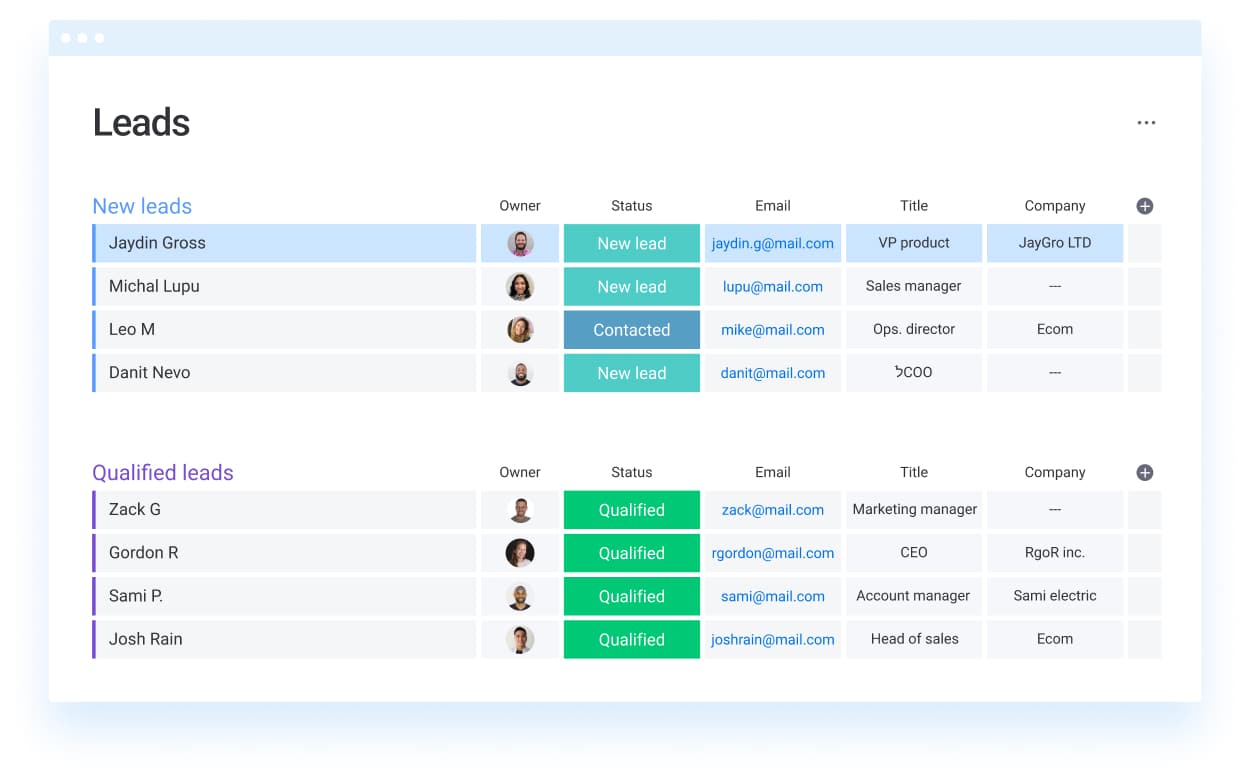
With monday CRM, teams can focus on productivity, maximizing their sales cycle, collaboration, and nurturing customer relationships all in one platform. Here are some of the features that make this possible:
- Powerful lead management: Use monday CRM to collect, track, and engage leads from any source in one platform. Automations can instantly qualify and score leads based on predetermined criteria to make them easier to sort.
- Insightful performance tracking: Keep track of your progress toward personal and team goals with performance-tracking reports and dashboards. Get overviews and detailed insights on pipelines, targets, team quotas, and individual performance to help you make decisions that can boost sales and improve customer satisfaction.
- Advanced data management: Make sure your data is always in tip-top shape with monday CRM’s tools to handle data. Merge duplicate items, import data from external sources or documents, and capture lead details from existing apps or web forms.
- Real-time communication tools: The built-in tools in monday CRM, along with additional integrations, make communicating with your team and clients a breeze. Send updates in real-time, funnel all your emails to one place, and track and personalize interactions.
- Hundreds of integrations: With monday CRM, teams can integrate over 200 work apps and tools into their system to easily sync data and workflows, whether it’s pulling data from an email marketing system or creating tasks from chats on a communication platform.
Salesforce features
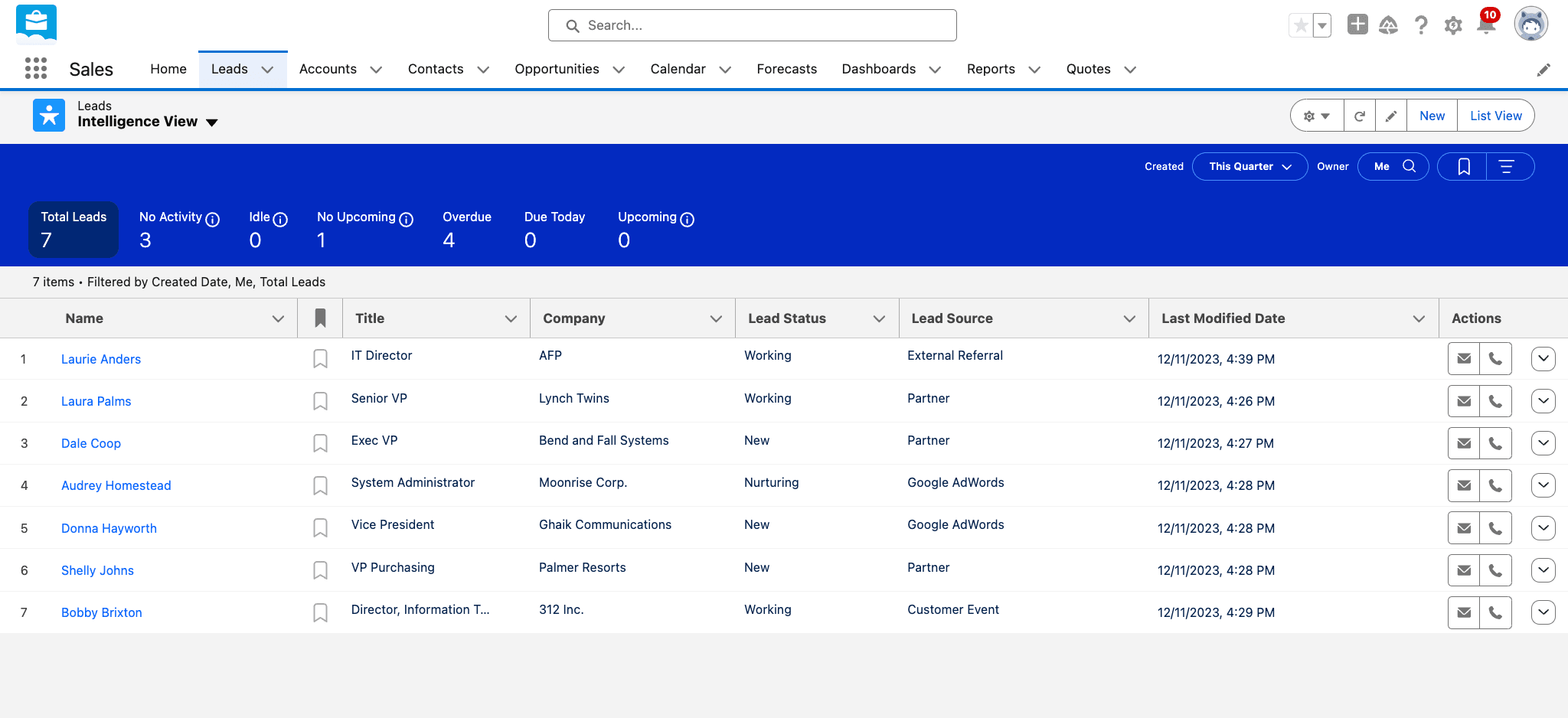
Salesforce’s selling point is its add-ons, creating a complete portfolio of products. Whether it’s apps created by Salesforce or third-party integrations, these tools help bolster the platform’s CRM and provide extra functionality. Here are a few features you get with Salesforce:
- Integrate with popular work tools: Through the Salesforce AppExchange, companies can sync many popular work apps with their CRM to integrate workflows and make sure data seamlessly flows between platforms.
- Reach clients with Marketing Cloud: Create B2B or B2C email campaigns, manage customer loyalty programs, and personalize messaging with the Salesforce Marketing Cloud. This application helps sales and marketing departments work together on the same platform for smoother operations.
- Detailed reporting tools: With Salesforce, organizations can collect and analyze essential data and generate reports to understand how CRM activities are progressing. Managers can access performance reports and use them to coach agents, as well as pipeline analytics provides insights on target attainment.
- Scale operations with Service Cloud: As an application on Salesforce CRM, Service Cloud enables you to automate customer service processes, connect service data across different channels, and also helps you create resources to allow customers to find solutions on their own.
- Bring costs down with Sales Cloud: Another one of Salesforce CRM’s applications, Sales Cloud, helps sales teams close deals with AI-powered technology. The tool’s AI helps provide data and insights to optimize the sales process, automates daily sales tasks to increase rep productivity, and helps you view and manage the sales forecast.
monday CRM vs Salesforce: AI and automation
Most modern CRMs rely on AI and automation to boost productivity and enhance sales operations. Salesforce and monday CRM both offer advanced AI and sales automation features that users can apply to various scenarios to work more efficiently. Let’s take a look at the AI and automation features in both platforms.
monday CRM AI and automation
One of the main features users love about monday CRM is how simple it is to use AI to create custom automations that fit their specific workflows. One reviewer on G2, Jordan T., applauds the platform’s “ flexibility and automation power,” and says that “if we spot a recurring task, we can automate it—e.g., a qualified lead automatically spawns a deal, contact, and account, cutting manual entry.” Here are some of monday CRM’s AI and automation features in more detail.
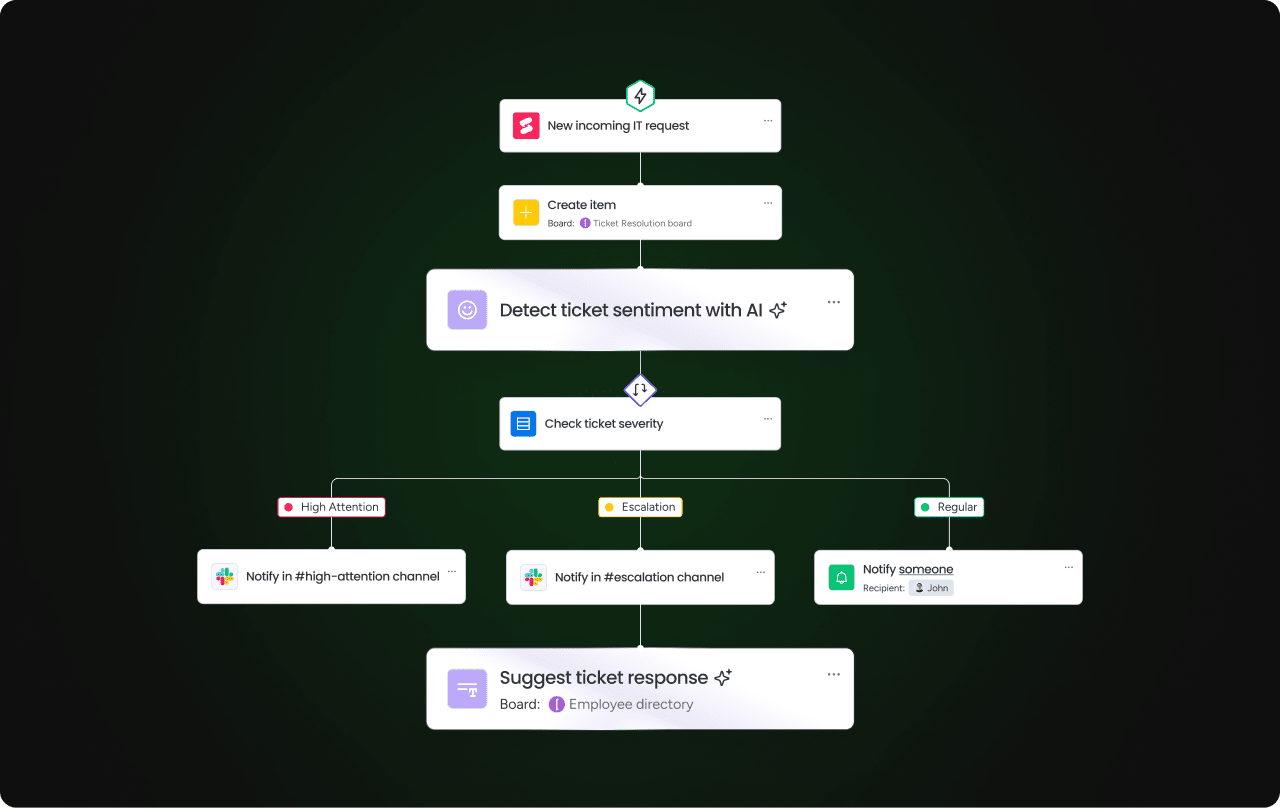
- Customized powerful automation: With monday CRM, teams can create custom automations that trigger actions to replace manual, repetitive tasks like sending prospect follow-ups, updating a deal status, or sending approval requests.
- Generative AI: Sales and marketing teams can generate personalized emails based on previous engagement and communication, along with assets like sales decks and marketing material, thanks to monday CRM’s AI.
- AI assistant: With monday sidekick, a built-in AI assistant, teams can use natural language to generate new content, get suggestions for next steps on a deal, and complete tasks like finding business addresses in an instant.
- AI sales forecasting and predictive analytics: Teams can access accurate predictive analytics and sales forecasting to understand which deals in the pipeline are likely to close and to better manage resources based on trends and historical data.
- Sentiment detection: The platform can detect sentiment in prospect and customer communications to highlight clients that need closer attention, then an automation can flag prospects that need closer attention to the right sales agent for proactive intervention
Salesforce AI and automation
Similar to monday CRM, Salesforce users also appreciate the software’s AI tools and automation capabilities. A review by Nicholas S. on G2 says this:
It offers powerful AI-driven features like Einstein AI, which helps automate sales forecasting, customer interactions, and service tasks, making work much more efficient.
Below, we’ll look at Salesforce’s top AI and automation features.
- Boost productivity with Einstein: Salesforce’s AI tool helps users supercharge productivity by working faster. Einstein AI can help you personalize each customer experience, guide sellers through a sales pipeline, and automate analytics to get you the data you need quickly.
- Agentforce Assistant: Salesforce offers an AI assistant that users can chat with to execute tasks based on CRM data, metadata, and prompts, bringing conversational AI to the platform.
- AI-driven insights: Through Salesforce Data Cloud, teams can get AI-driven insights on current deals or customer accounts to better understand which steps to take moving forward and make stronger decisions
- Automated AI sales emails: Agents can automatically generate personalized emails based on CRM data using AI to send targeted messages that resonate.
- Marketing AI automations: Use Salesforce’s built-in AI to identify the most highly engaged prospects in your pipeline and determine the best email sending time, frequency, and personalize content for each one.
monday CRM vs. Salesforce: Integrations
Integrations and apps help you improve the performance of your CRM by pooling all your work tools into one platform, allowing you to stay focused and organized. While Salesforce has more app integrations than monday CRM, more isn’t always better. With monday CRM, teams can integrate the most common work tools on the market to keep everything unified. There’s also a Salesforce integration, giving teams the best of both worlds.
Here’s a look at some of the different integrations available with both monday CRM and Salesforce.
monday CRM integrations
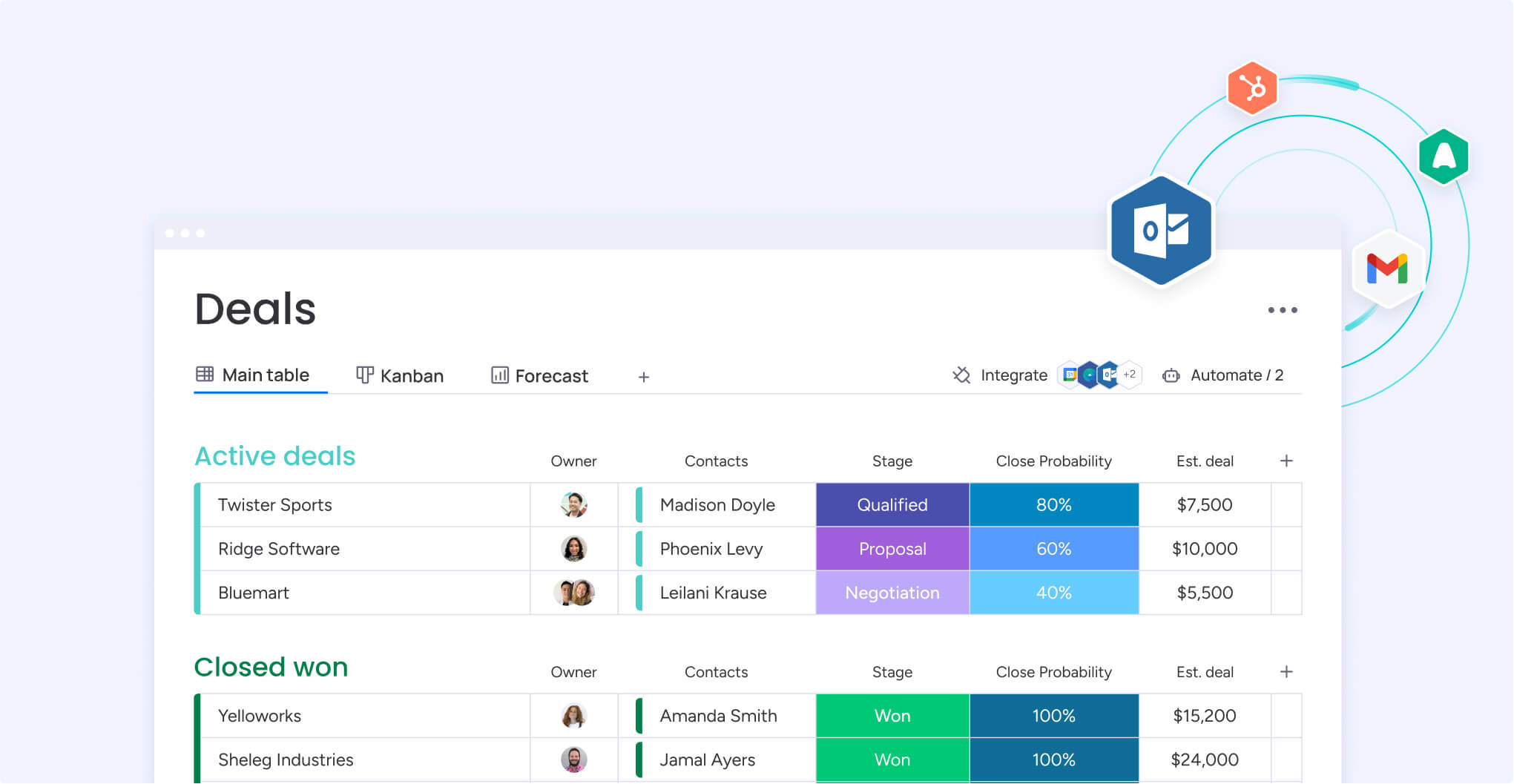
There are over 200 apps and integrations available, allowing you to connect the most popular work platforms with your CRM. There are email clients like Gmail and Outlook, document managers like PandaDoc and DocuSign, payment processors like Stripe, social media apps like Facebook that help you collect leads from your campaigns, email integrations like Mailchimp, and much more.
Salesforce integrations
Salesforce has 3,000+ integrations and apps available through its AppExchange, allowing you to personalize your CRM to your liking. You’ll find integrations here for plenty of apps to sync different tools, like SurveyMonkey, Zapier, LinkedIn, Asana, and many more. Apps are categorized by industry so that you can easily find the tools you need to pad out your CRM.
monday CRM vs. Salesforce: Pricing
The cost of your CRM is another factor to take into consideration when weighing your options. monday CRM ends up as the more affordable option, not only because its plans are cheaper.
With Salesforce, many of the features you want need to be added on at an extra cost, meaning you need to pay more to get similar functionality to another CRM. Here’s what you can expect both platforms to cost.
monday CRM pricing
The pricing for monday CRM pricing includes 4 tiers of paid plans as well as a free 14-day trial. Let’s take a closer look at each plan:
- Basic: $12/seat/month, includes unlimited pipelines, contacts, and boards, a dashboard based on 1 board, and unlimited free viewers
- Standard: $17/seat/month, includes everything from the Basic plan in addition to email integrations, advanced account management, merging duplicate data, AI email generator, 250 custom monthly CRM automations and integrations, and a dashboard that combines 5 boards
- Pro: $28/seat/month, includes everything from previous plans as well as sales forecasting software features, email templates and sequences, quotes and invoices, sales analytics, 25,000 monthly CRM automations and integrations, and a dashboard that combines 20 boards
- Enterprise: Pricing is based on a personalized quote, but includes everything from previous plans and lead scoring, team goals, advanced analytics, sales document library, enterprise-scale automations and integrations, multi-level permissions, and HIPAA compliance
Salesforce pricing
According to the Salesforce CRM pricing page, there are also 4 tiered paid plans in addition to a 30-day free trial. Here’s a breakdown of the plans:
- Starter Suite: $25/user/month, includes simplified onboarding, lead management, dynamic email marketing and analytics, and account management tools
- Pro Suite: $100/user/month, includes everything from the Starter Suite plan in addition to customizable reports and dashboards, sales quoting and forecasting, access to AppExchange, and more
In addition to the above plans, there are also various additional plans, including Salesforce Foundations, which allows you to add key features to your existing CRM, and Salesforce Sales Cloud plans for additional CRM functionality.
monday CRM vs Salesforce: Ease of use
Simplicity is key, and although Salesforce isn’t necessarily difficult, depending on how you’re using it or your technical know-how, monday CRM is a lot simpler to use. To help understand how ease of use affects both platforms, let’s take a look at some customer comments about using each platform.
monday CRM ease of use
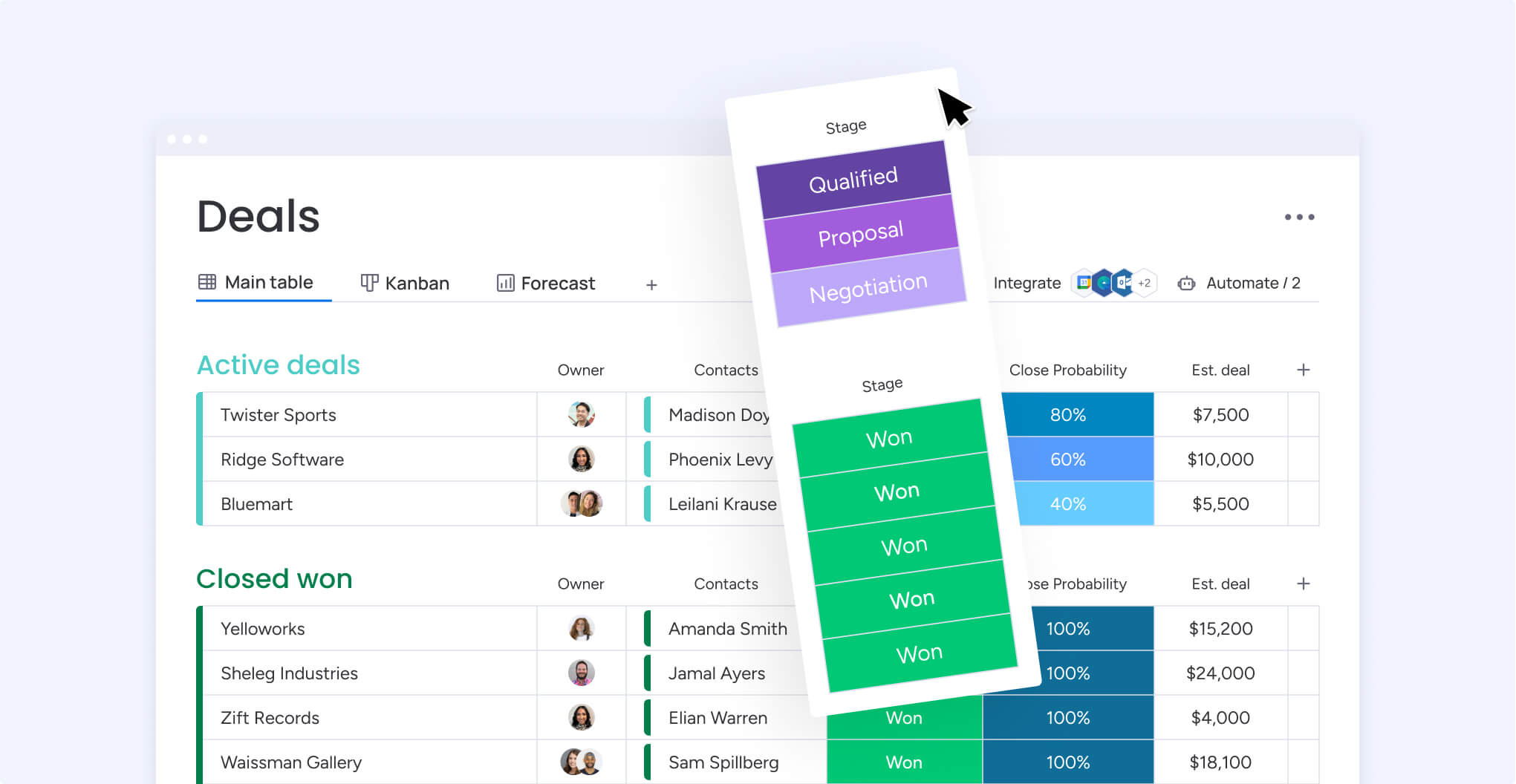
Reviews of monday CRM on G2 call the platform “extremely user-friendly and uncomplicated” and one verified user in the wholesale industry had this to say:
The user-friendly layout has allowed even the most tech-wary members of my team … to track leads, add project updates, and generally foster a more collaborative work-environment.
Indeed, monday CRM comes with easy-to-launch templates and boards that make onboarding a breeze and require very little technical background.
For example, in monday CRM, automations can be customized in just a few clicks, meaning you can create powerful workflows in a few minutes to help make your processes run smoother and work how you want them to.
Salesforce ease of use
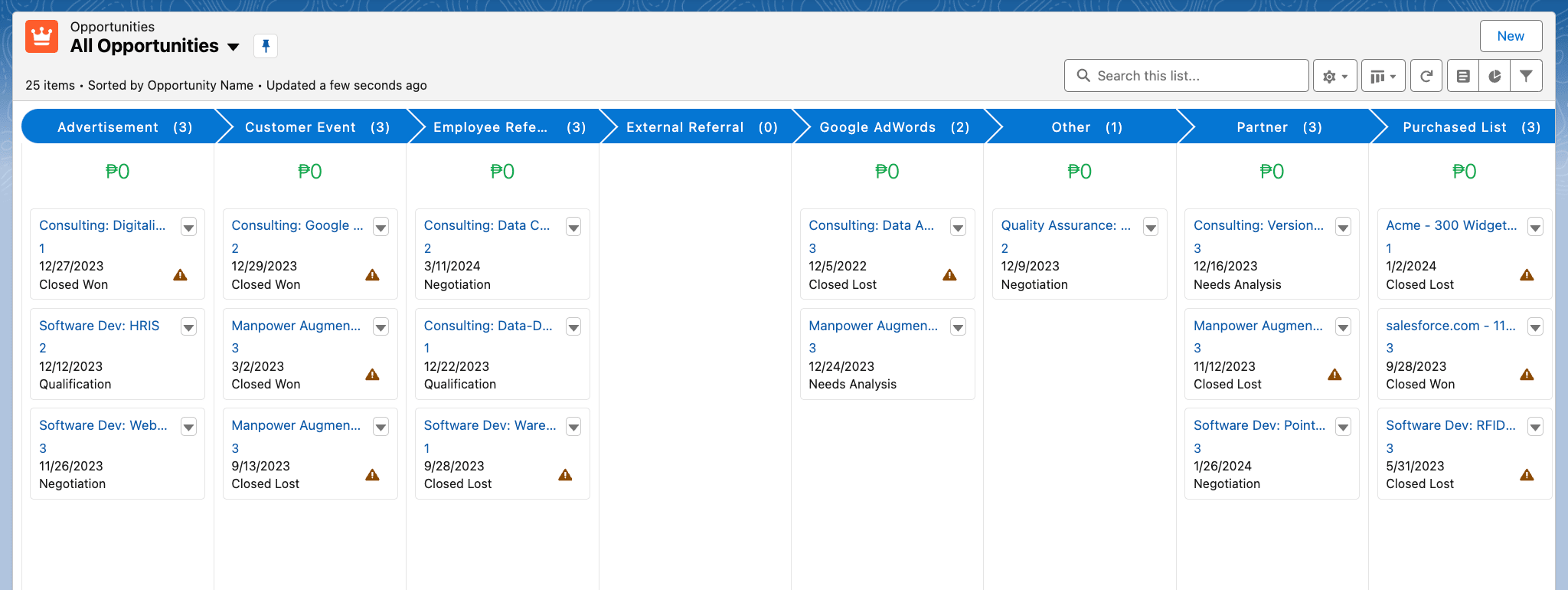
While there are many elements of Salesforce that are easy to use, such as navigation or adding new sales reps, there are Salesforce reviews on G2 that comment on its intricacy. One user, Vaibhav G., wrote this:
I found that the platform’s user interface and navigation are complex or overwhelming, requiring significant training and onboarding time for new users.
Depending on your team’s technical background, different people find Salesforce to be either intuitive or complicated to adopt.
monday CRM vs Salesforce: User experience
The overall user experience can make or break your team’s adoption of a new CRM. While both monday CRM and Salesforce get the job done, they take very different approaches to design and usability. Here’s how the day-to-day experience compares between the two.
monday CRM user experience
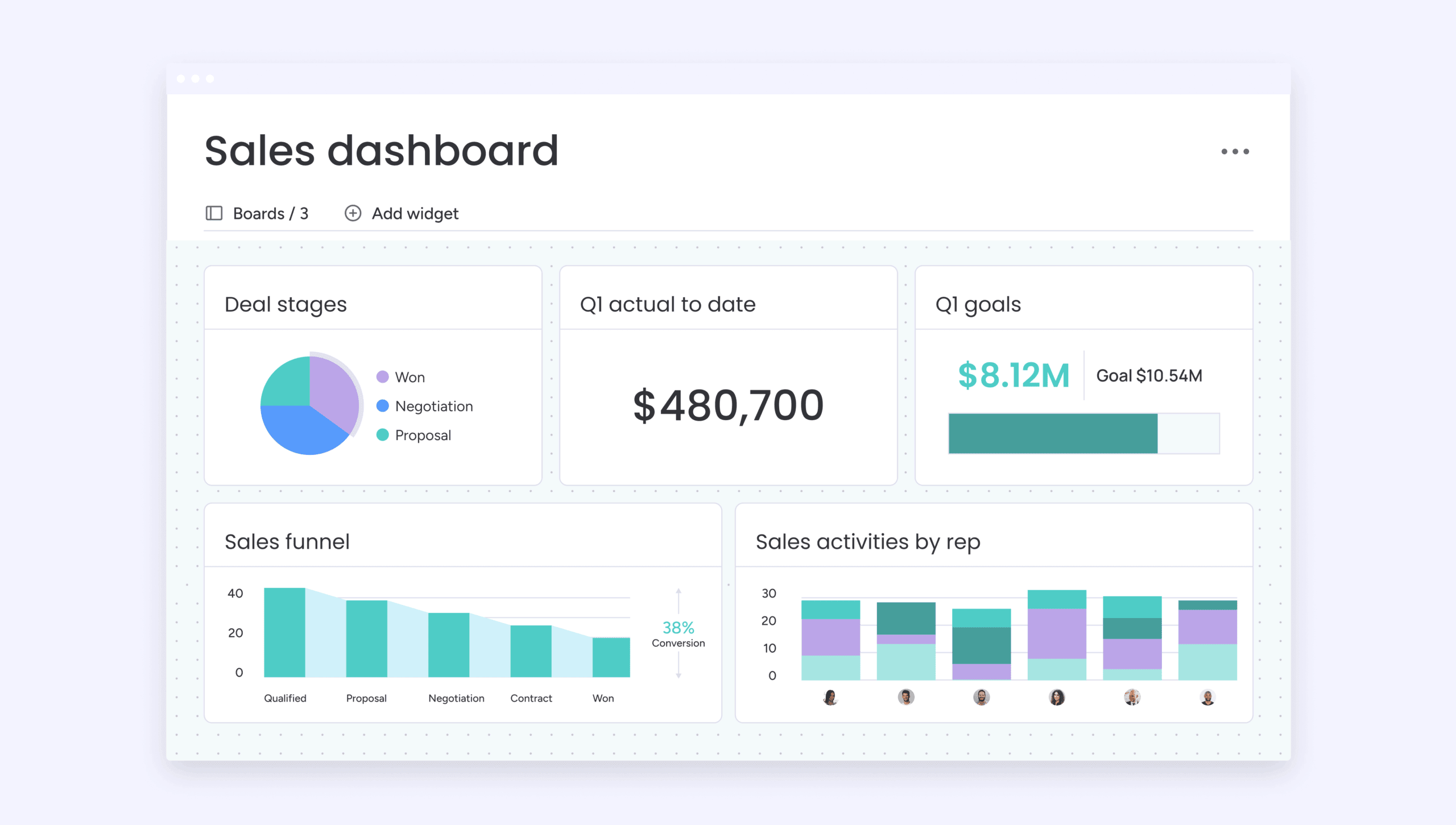
With monday CRM, you get a clean, intuitive interface that feels more like a modern work management tool than a traditional CRM. The visual boards and colorful status columns make it easy to see your sales pipeline at a glance, and the drag-and-drop functionality feels natural for most users.
Teams appreciate how the platform doesn’t overwhelm them with endless menus and options, but instead, everything is laid out logically with clear visual cues that help you understand where you are and what you need to do next.
Salesforce user experience
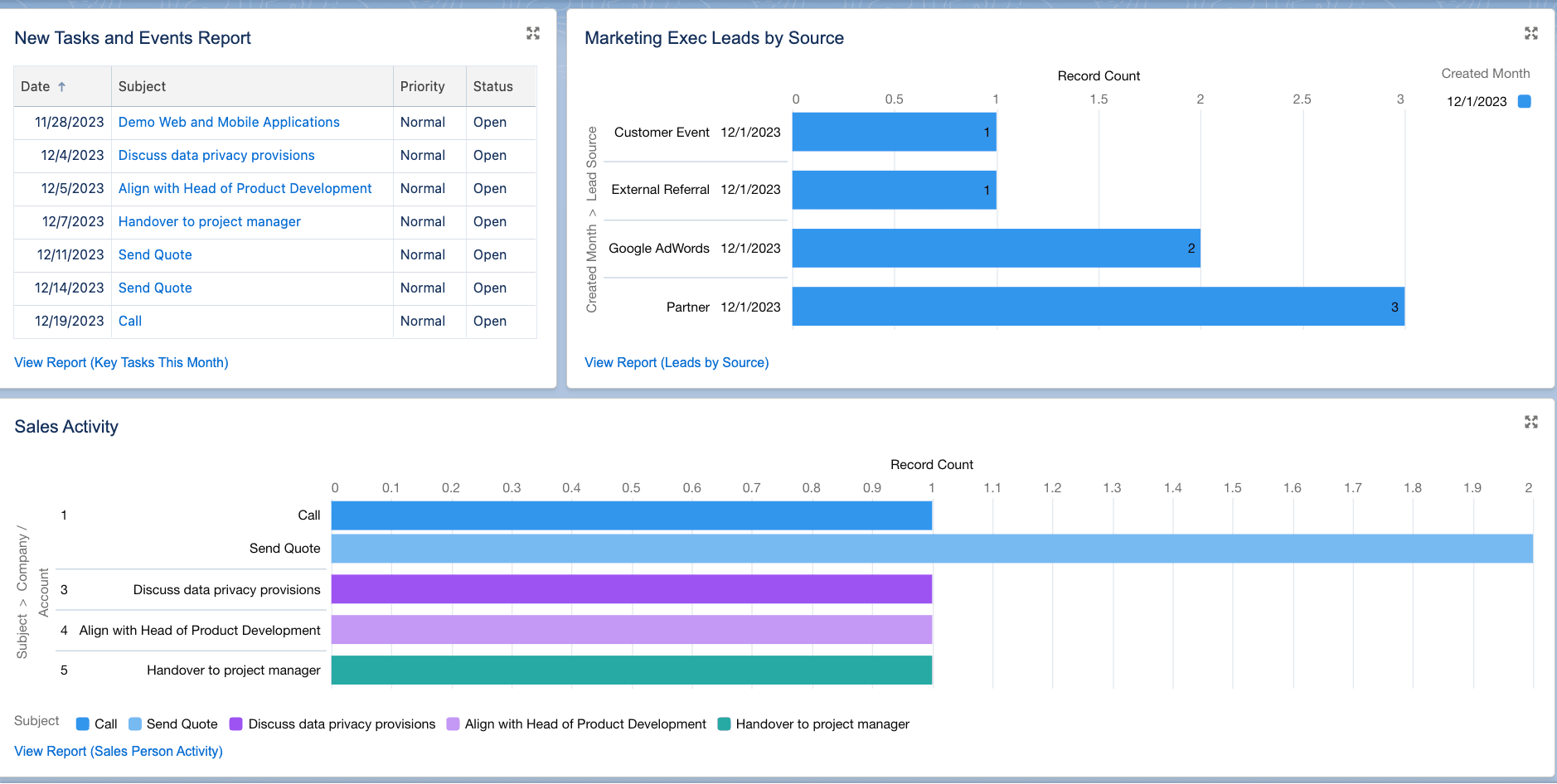
Salesforce offers a more traditional enterprise software experience with extensive customization options, but this comes with added complexity. While the platform is powerful, navigating through its many tabs, modules, and configuration options can feel overwhelming, especially for new users.
The interface tends to prioritize functionality over simplicity, which means there can be more than one way to accomplish the same task. This flexibility is great for large organizations with specific needs, but it can also lead to decision paralysis for smaller teams who just want to get up and running quickly.
monday CRM vs Salesforce: Customer support
Customer service has the potential to make or break an experience with new software. When your team is supported with extra resources, personalized help, or accessible service, it makes the learning curve a lot less daunting. Let’s look at what support is available on both platforms.
monday CRM support
There are tons of resources to help you get used to monday CRM, such as articles, videos, daily live webinars, a Knowledge Base for common questions, and a community where you can connect with other users and participate in discussions. For users, service is offered in the form of 24/7 customer support with a ticketing system and a dedicated customer success manager for Enterprise plan users.
Salesforce support
Salesforce has a number of different contact options, including online documentation, communities, support forms, 24/7 chat support, and phone support. The level and avenue of support available to you depend on your plan, with different levels of personalized success plans that come as part of your plan costs or are charged separately. With the higher level of these support plans, you can get expert coaching, account management, professional services, and more.
monday CRM vs Salesforce: Customer reviews
Looking at what current or past users have to say about both platforms can be a helpful deciding factor. Here’s a look at both monday CRM and Salesforce customer reviews on the popular software review site, G2.
monday CRM customer reviews
G2 rating: 4.6/5 (1,000+ reviews)
Reviews on G2 call monday CRM the “best all-in-one CRM,” “robust and capable,” and “extremely customizable.” When it comes to the platform’s AI and automation capabilities, users are saying that monday CRM’s AI columns are “yielding useful pipeline and forecasting insights.” Here’s what Josue (Lolo) R. had to say on G2:
The ability to customize each board to match our exact processes allows us to stay organized without being boxed into a rigid system. I especially appreciate the automations and status updates that reduce the need for constant follow-ups and reminders.
According to customer testimonials, the main critiques about the product include requests for additional integration options, a learning curve for those who aren’t used to using similar products, or that it can take time to make full use of all the available features.
Salesforce customer reviews
G2 rating: 4.4/5 (23K+ reviews)
User reviews on the Salesforce G2 page call it “the CRM platform for established businesses,” a “powerful platform,” and “flexible.” Salesforce users seem to like the available AI features, with Mohammed R. saying:
Tools like Salesforce Flow and Einstein AI help automate repetitive tasks, score leads, and even suggest next best actions.
That said, there are several reviews mentioning that Salesforce can be complicated, overwhelming, and not very intuitive, while some users also comment on the high price tag. Other users mention a steep learning curve that can make the platform feel “daunting without proper training” and “complex to master without significant resources.”
monday CRM vs Salesforce: Strengths and considerations
When weighing your options, it’s helpful to see the main advantages and drawbacks of each platform side by side. Both CRMs have their strengths and challenges depending on what you’re looking for in a solution. Here’s a quick pros and cons comparison:
monday CRM strengths and considerations
Strengths
- Affordable pricing with transparent costs and no hidden fees for essential features
- Intuitive, visual interface that requires minimal training and onboarding time
- Powerful automation and AI features are built in at every pricing tier
Considerations
- Fewer total integrations compared to the Salesforce AppExchange marketplace
- The Basic plan has limited customization features and automations that some small teams may want
- Admin and advanced security features outside the higher-tiered plans are limited
Salesforce strengths and considerations
Strengths
- Extensive customization options and advanced enterprise-level features
- Massive ecosystem with 3,000+ integrations and third-party apps
- Advanced AI capabilities with Einstein and predictive analytics across business functions
Considerations
- High costs with many essential features requiring expensive add-ons
- Steep learning curve and complex interface that can overwhelm users
- Over-engineered for small to medium businesses that don’t need enterprise complexity
Salesforce vs monday CRM: Which is the right tool for you?
When it comes down to it, most businesses want to use a CRM that’s simple and straightforward, but that also doesn’t skimp out on functionality or customization options. For that reason, we think monday CRM fits a wider range of business needs.
Salesforce is still a highly reliable platform used by many businesses globally. However, its steep learning curve and even steeper prices make it not as accessible for some, leaving them to look for Salesforce alternatives. Also, the fact that you need to add on extra products like Data Cloud or Marketing Cloud to make the most of the platform can be a turn-off for smaller teams with limited budgets.
Aside from that, monday CRM’s accessible AI and automation features stand out for their customizability and how simple they are to execute, putting the power of advanced artificial intelligence in the hands of every business, even when employees don’t have in-depth technical skills. Additionally, monday CRM can fit a number of different businesses, from small teams to enterprises, and can be scaled to fit both your budget and your needs.
Finally, with monday CRM’s Salesforce integration, you don’t even need to choose between one or the other, and you can easily sync both platforms to get the best of each. Overall, you only need to look as far as customer reviews to see that monday CRM users are happy with the platform and find it to be an essential, intuitive work tool.
monday CRM vs Salesforce: Best use cases
Choosing the right CRM often depends on your company size, resources, and goals. Here’s how the platforms stack up for different business types:
- Small businesses: Affordable pricing, easy onboarding, and intuitive boards make monday CRM ideal for teams without technical admins or large budgets.
- Mid-market companies: The monday CRM platform scales smoothly with growing automation and AI needs, while Salesforce may appeal if advanced reporting or niche integrations are required.
- Enterprises: Salesforce shines with its extensive ecosystem, deep customization, and industry-specific clouds, but monday CRM is a strong fit for enterprises seeking simplicity or integration with Salesforce.
- Teams prioritizing AI: Everyday automations are easy to set up with monday CRM, while Salesforce provides enterprise-grade AI capabilities that often require expert configuration.
Find the right CRM fit for your business
Both monday sales CRM and Salesforce bring powerful features to the table, but they serve different audiences. Salesforce remains a heavyweight for enterprises with deep budgets and complex customization needs, while monday CRM delivers a modern, intuitive experience that helps teams of all sizes move faster without the steep learning curve.
If your business is looking for a CRM that combines affordability, AI-powered automation, and seamless usability, monday sales CRM is the stronger choice. With the added flexibility of integrating with Salesforce, monday CRM ensures you don’t have to compromise — you can streamline your workflows today and scale confidently into the future.
Try monday CRMFAQs
Is monday CRM a good Salesforce alternative?
Yes, monday CRM is an excellent Salesforce alternative, especially for teams prioritizing ease of use and cost-effectiveness. The platform offers rich CRM functionality with powerful automation, AI features, and integrations at a fraction of Salesforce, making it ideal for small to medium businesses that prioritize simplicity without sacrificing capabilities.
Which CRM is better for a small business?
Small businesses can benefit from monday CRM due to its affordable pricing, intuitive interface, and quick setup process. Starting at just $12/seat/month compared to Salesforce's $25 minimum, monday CRM provides essential CRM features without the complexity and additional costs that make Salesforce overwhelming for smaller teams.
Can I integrate monday CRM with Salesforce?
Of course! Teams can access an integration to use monday CRM and Salesforce together, allowing teams to connect both platforms and sync data between them. This gives you the flexibility to leverage monday CRM's user-friendly interface while maintaining connections to existing Salesforce data, providing the best of both worlds for teams transitioning between platforms.
Does Salesforce have a steeper learning curve than monday CRM?
User reviews often mention that Salesforce has a steep learning curve and highlight monday CRM’s simplicity. Salesforce's complex interface with multiple configuration options requires significantly more training time, while monday CRM's visual boards and intuitive design allow even non-technical team members to get started quickly.
Is Salesforce better for sales forecasting and analytics?
No, monday CRM actually matches Salesforce's forecasting capabilities while being more accessible. With monday CRM, teams get AI-powered sales forecasting, predictive analytics, performance tracking dashboards, and detailed pipeline insights all on one easy-to-use interface. The key difference is that monday CRM presents these analytics in a more user-friendly format that teams can easily understand and act upon.
How do the automation features compare between monday CRM and Salesforce?
Both platforms provide AI-powered automations, but monday CRM emphasizes ease of use with customizable workflows at every plan level. Salesforce offers deeper enterprise-level automation with Einstein AI, though many advanced features come at an extra cost.
Do both monday sales CRM and Salesforce have AI capabilities?
Yes, with monday CRM offering built-in AI tools like sidekick, predictive analytics, and sentiment detection, and Salesforce relying on Einstein AI and Agentforce Assistant. The key difference is monday CRM’s simplicity vs Salesforce’s enterprise-grade depth.

